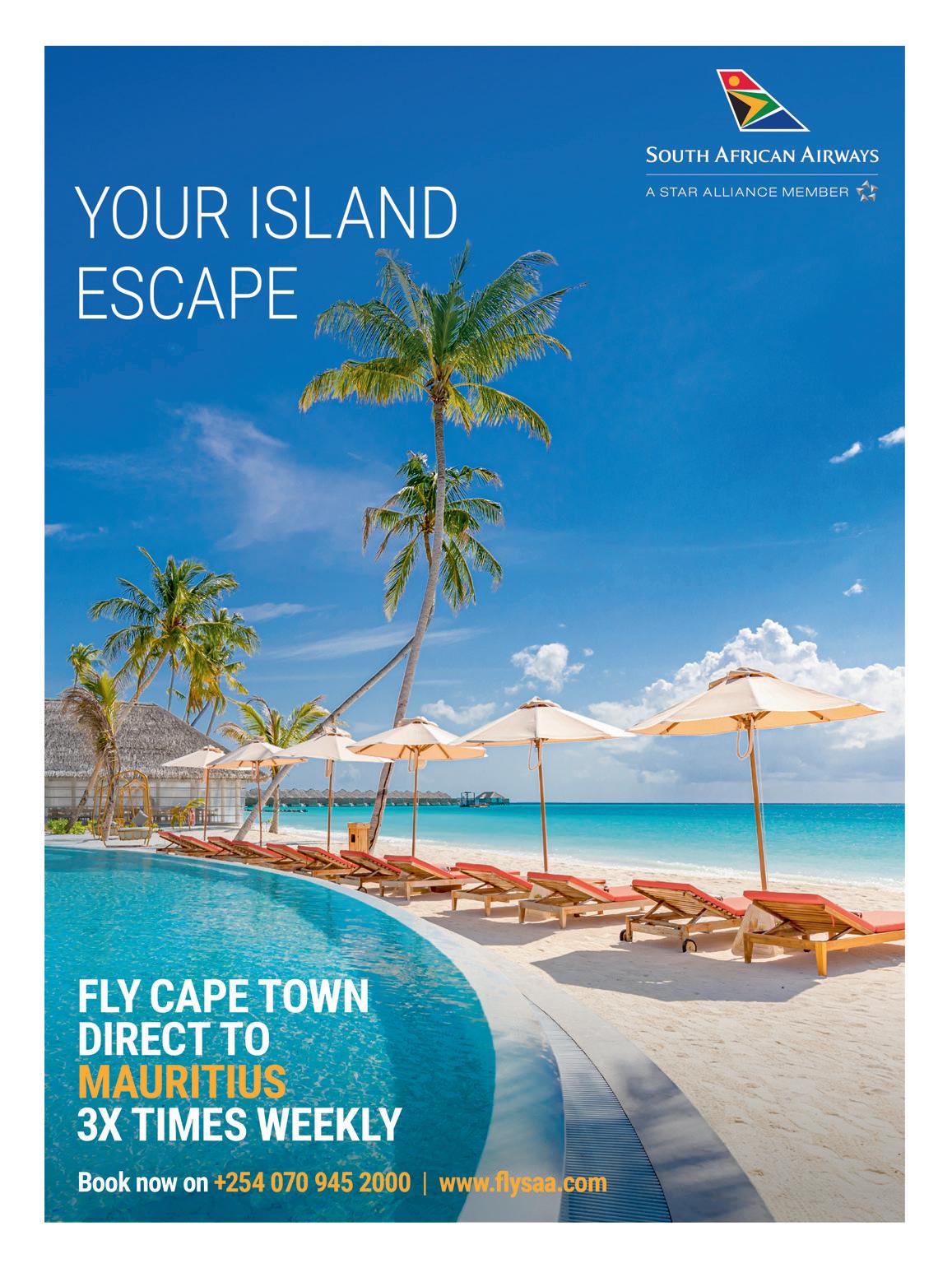White-water rafting
Thrilling

Protecting Kilimanjaro
A
New big screen thriller features host of East African talent in front of and behind the cameras
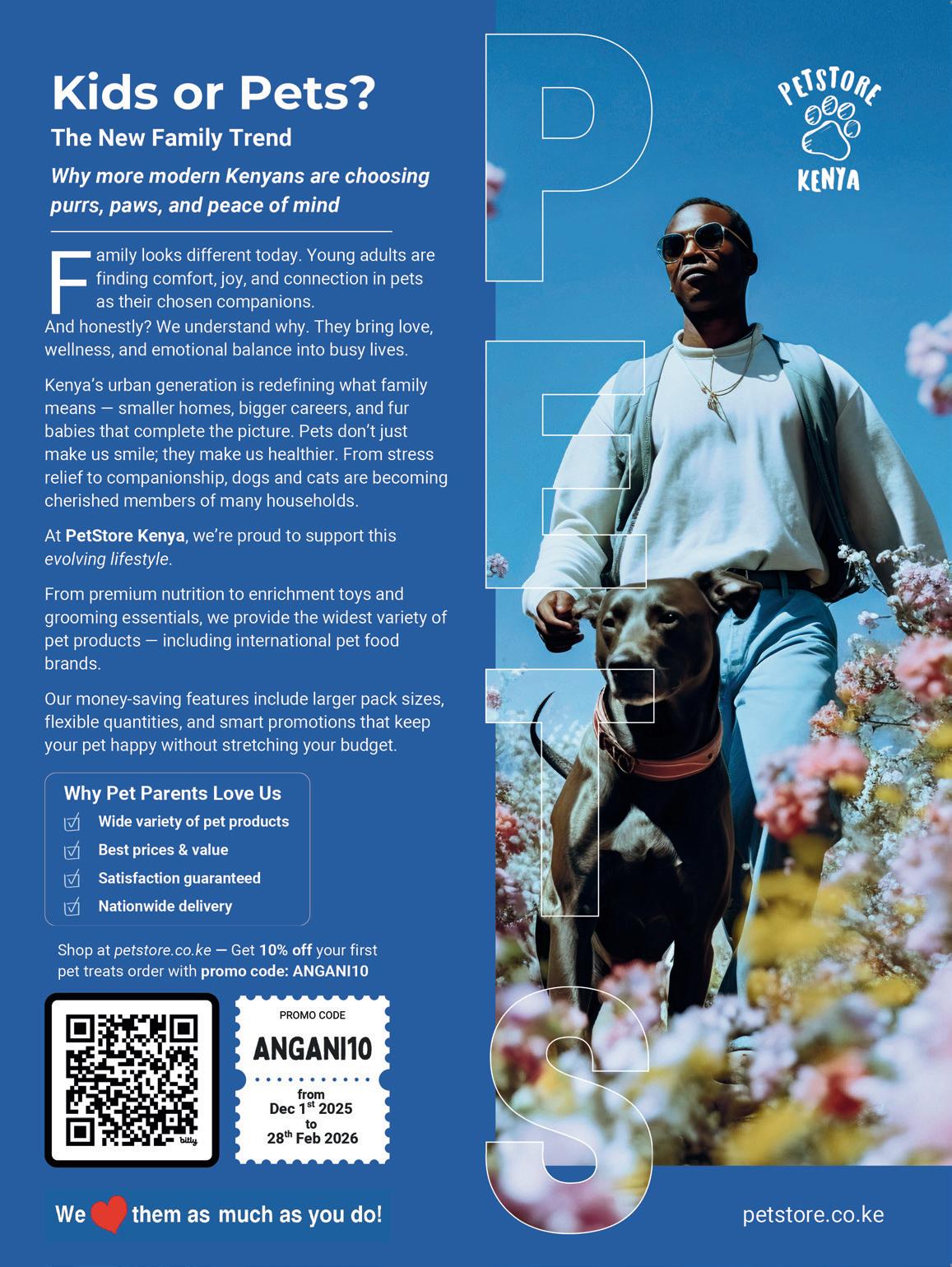


Thrilling

A
New big screen thriller features host of East African talent in front of and behind the cameras


Welcome aboard Skyward Airlines –Kenya’s fast-rising regional airline, now connecting you to nine vibrant destinations across East Africa. Whether you’re heading to Nairobi’s bustling cityscape, the serene beaches of Diani and Malindi, the adventure-filled landscapes of Lodwar or to Dar es Salaam, our mission is to help you ‘Fly Easy.’
We are committed to making travel smooth and flexible for our passengers. Our expanded fleet, now featuring Fokker 100 jets, means we’re flying further and serving you better than ever before. For a truly bespoke flight experience, we have introduced the Skyward Airlines Charter for private passengers or cargo. Here, every journey is tailored to your own needs. Our plane, your schedule.
But flying easy is about more than just convenience, it’s about caring for the destinations we serve. Skyward Airlines understands that successful aviation depends on thriving, sustainable destinations while modern travellers increasingly want their journeys to contribute positively to the places they visit.
That’s why we’re proud to support environmental initiatives such as the East African Ocean Festival (TEOF) beach clean-up at Jumeirah Beachfront‚ in Mombasa. We have also sponsored ‘Guardians of the Peak – Season II’ – a trek up Mount Kenya to promote clean energy and environmental conservation.
Every journey with Skyward Airlines is a step toward a brighter, cleaner future for East Africa. Thank you for choosing us as your partner in travel and conservation.

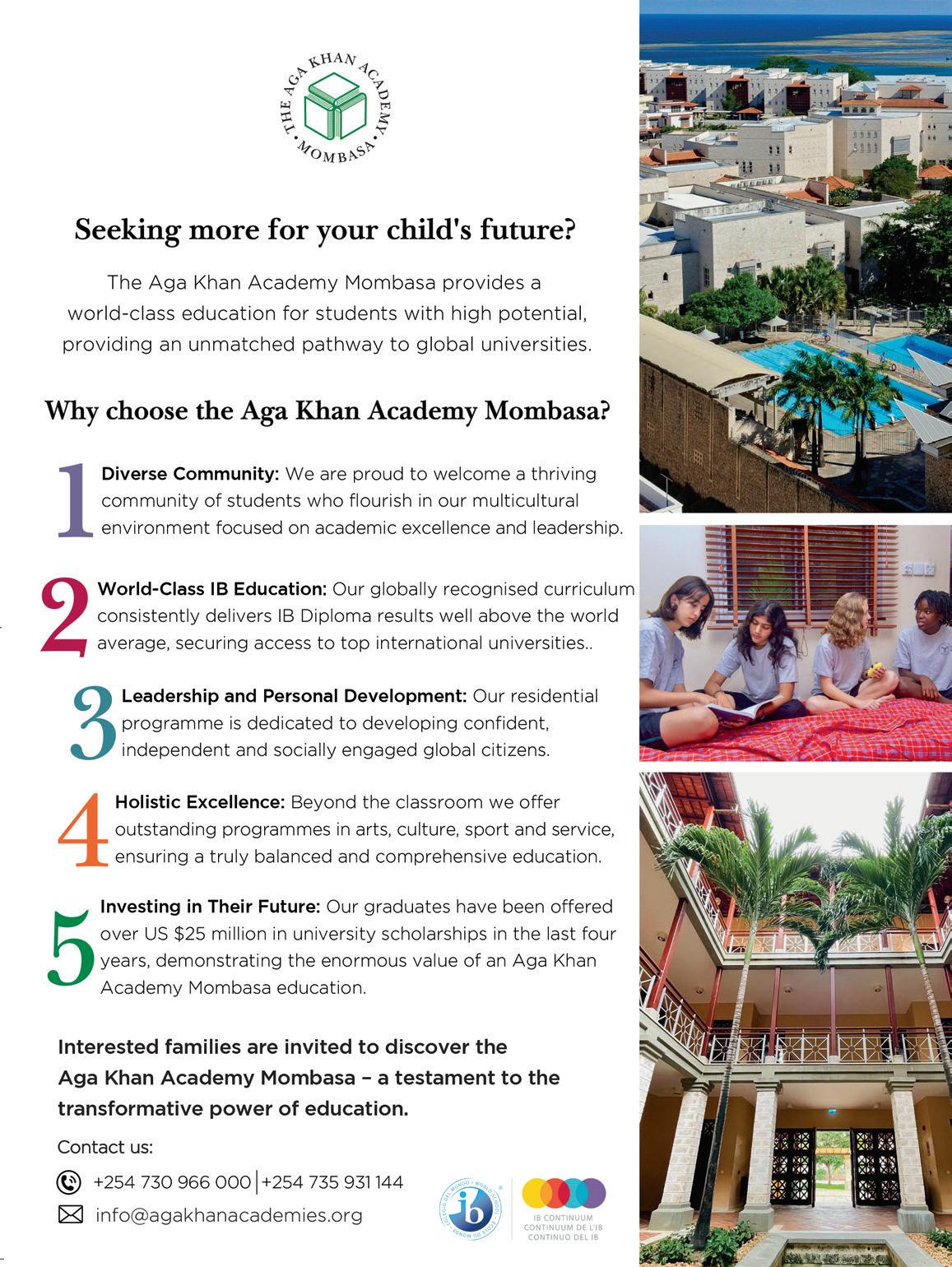
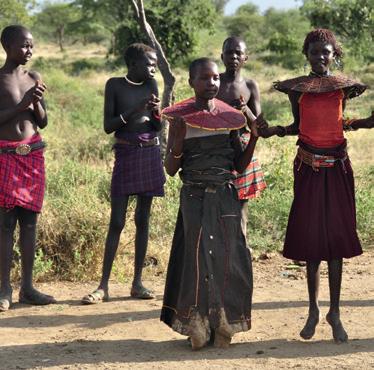
Stars in front of and behind the camera reveal the journey that brought new Covid-inspired thriller to the big screen

Western Kenya town has something for everyone
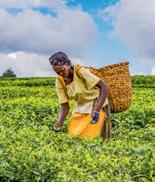
Inside Kenya’s highlands
Eldoret for tea lovers

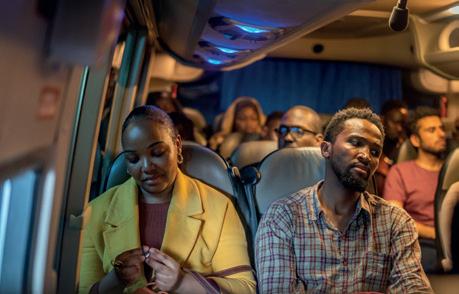
‘My father bought me a Stetson and my love affair with country music began’ Guardians of the peak
Protecting Kilimanjaro, inspiring the world
Harriet James selects five of the best podcasts to get your fix of tech, true crime, pop culture, or comedy


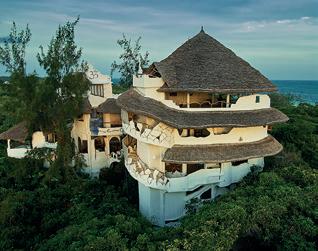
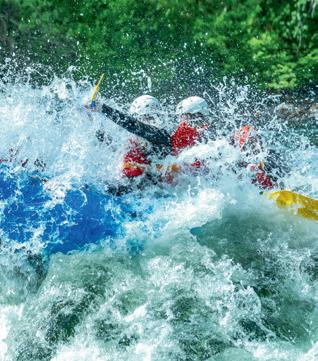

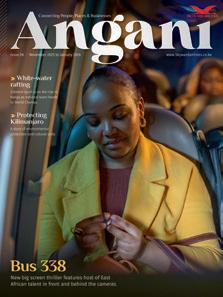

Co-owner

Set amid the lush highlands of western Kenya, Kitale is a unique blend of natural beauty, rich history, and vibrant culture waiting to be explored by intrepid travellers. Whether you’re an adventure seeker, a history buff, or simply looking to unwind, Kitale has something for everyone.

Kitale is surrounded by rolling hills, verdant forests, and fertile farmlands. One of the must-visit spots is the Saiwa Swamp National Park. It is the Kenya’s smallest national park, only 3 sq km, and was created as a habitat for the sitatunga, a rare – at least in Kenya – aquatic antelope. This small but enchanting park offers a network of boardwalks and observation towers, perfect for spotting these elusive creatures and a variety of bird species.
For those who crave a bit more adventure, Mount Elgon is just a short drive away. The 4, 321-metre-high mountain bisects the Kenya and Uganda border. On the Kenyan side is the Mount Elgon National Park where you can explore ancient caves in the foothills and hike through montane forests that are
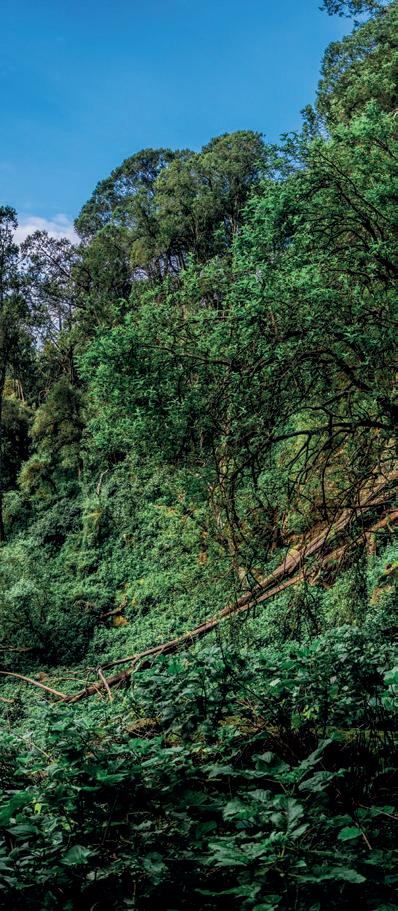
Kitale is also an access point to the Cherangani Hills. This biodiversity hotspot is home to a variety of plant species, including indigenous forests, bamboo, and rare

Afro-alpine vegetation. They also support diverse wildlife, including endemic species such as the Cherangani Hills mole-rat. Hiking here offers varied trails through lush forests and farmlands, ideal for birdwatching and a solitary communion with nature.
Kitale is one of Kenya’s key flower-growing regions. Located in the fertile Rift Valley, the town’s volcanic soil is naturally rich in nutrients, which is essential for healthy plant growth and vibrant blooms. Many of its flowers such as roses, carnations, and lilies are grown for export to the lucrative European market. Many local farms offer tours where you can see the vibrant fields in full bloom, learn about the cultivation process, and even pick your own bouquet to take home. Flower farming not only adds to the area's natural beauty but also plays a significant role in the local economy, providing employment and supporting the community.
Kitale is steeped in history, and there are plenty of opportunities to step back in time. The Kitale Museum is a great place to start. This fascinating museum, which was set up in 1902, showcases the region’s rich cultural heritage, with exhibits on traditional artifacts, colonial history, and the local flora and fauna. Don't miss the outdoor section, where you can see traditional homesteads and learn about the lifestyles of the indigenous communities.
Kitale is a melting pot of cultures, and there's no better way to experience this than
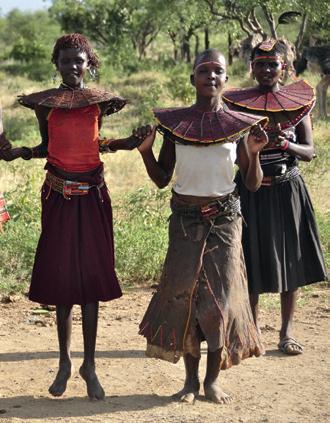
by immersing yourself in the local way of life. Visit the bustling Kitale Market, where you can sample fresh produce, handmade crafts, and delicious street food. The market is a sensory overload, with vibrant colours, tantalising aromas, and the lively chatter of vendors and shoppers.
For a deeper cultural experience, consider spending a day with the Pokot or Marakwet communities. These indigenous groups are known for their rich traditions and warm hospitality. Participate in traditional dances, learn about their customs, and even try your hand at some of their daily activities.
Kitale town boasts a number of charming cafés and restaurants, where you can enjoy a cup of locally grown coffee or indulge in some delicious cuisine. For a more tranquil experience, head to the Kitale Nature Conservancy, a serene oasis where you can take a leisurely stroll, have a picnic, or simply soak in the natural beauty.
Many of its flowers such as roses, carnations, and lilies are grown for export to the lucrative European market.
The Piny Luo Festival and Migori Cultural Extravaganza are journeys into Kenya’s living heritage. Let Skyward Airlines fly you there.
The fifth edition of the Piny Luo Festival is taking place in Migori County from the December 15 to 17 2025. The festival name translates as ‘Land of the Luo’ and the threeday event is a grand celebration of the cultural heritage of the Luo people of western Kenya.
Migori’s story is deeply rooted in its people’s proud traditions – from storytelling and music to fishing and intricate crafts. The festival will immerse visitors in these traditions.
This year’s event welcomes international cultural collaborations, including performances by international cultural troupes based in Kenya. There will also be symbolising the shared heritage between Migori and China.
Migori’s cultural mosaic
Migori is populated by diverse communities, including the Luo, Kuria, Luhya, Kisii, Suba, Somali Community, Indians, Arabs, Agikuyu, Nubians, and other ethnic groups of the Lake Region. In recognition of this cultural mosaic, the County Government of Migori has also incorporated the Migori Cultural Extravaganza, held on December 10 and 11 at Kehancha, in the run-up to the Piny Luo festivities.

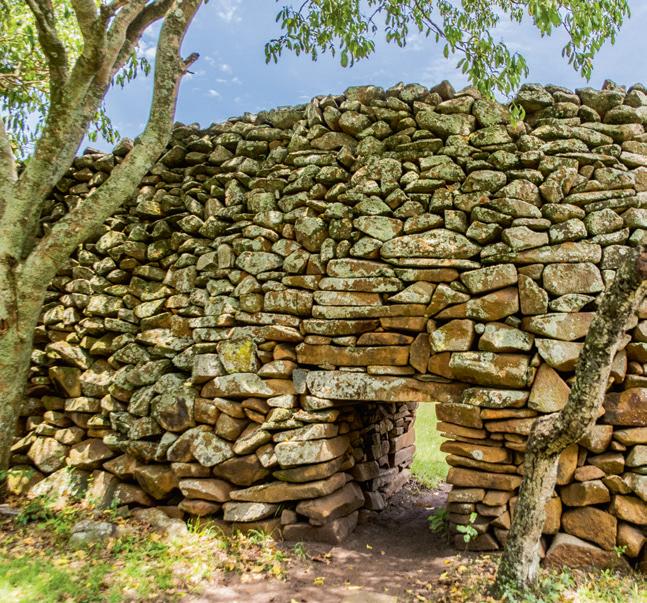
This ancient stone fortress, recognised as an Unesco World Heritage Site, is Migori’s crown jewel. This drystone walled settlement reveals the sophisticated engineering of early Luo-speaking peoples.
Nestled along the tranquil shores of Lake Victoria, Senye Beach is a hidden paradise where gentle waves kiss the sand as fishermen set out for the evening catch.
These gold mines offer a glimpse into the region’s vibrant mining history – a story of hard work, dreams, and transformation.
Got Kachola Hill, a sacred site for traditional ceremonies, provides panoramic views of Migori’s lush landscape. Nearby, Gogo Falls showcases the region’s blend of natural beauty and technological advancement.
Skyward Airlines passengers, get ready to take your taste buds on a journey as exciting as your destination!

We have teamed up with Pepsi to bring you an exclusive range of complimentary drinks on every flight – making your travel experience even more refreshing.
Since September 2025, Pepsi has become the sole soft drink provider on all Skyward routes. That means you can now enjoy your favourite PepsiCo brands – Pepsi, Mirinda, 7UP, Sting, Mountain Dew, and Aquafina water – in the sky.
Skyward Airlines chose Pepsi for its innovative spirit and growing presence in Kenya and East Africa. Both brands are committed to
growth and making every journey memorable. This partnership is all about giving you, our valued passengers, a dedicated in-flight refreshment experience.
So, sit back, relax, and let Skyward Airlines and Pepsi take care of your thirst while you enjoy the view. Here’s to happy travels and even happier taste buds!
The organisers have already set sights on 2026 when the festival becomes the official pre event for the Africa Peace & Environment Summit (APES 2) to be held in Nairobi.

Skyward Airlines was honoured to participate in the Magical Kenya Expo 2025 (MKTE), a premier event that brings together leaders and innovators from across the tourism sector to celebrate and advance Kenya’s vibrant travel industry.
As a key exhibitor, Skyward Airlines showcased its commitment to connecting people and places, supporting Kenya’s vision of sustainable tourism growth, and enhancing the travel experience for both domestic and international visitors.
We hosted a booth at the event, giving us the chance to promote our products (Angani included), connect with customers and spread the word on our role in supporting Kenya’s tourism industry.
With more than 547 flights and 26,000 passengers monthly across our growing network – that now includes Dar es Salaam over Kenya’s southern border in Tanzania – Skyward is proud to be connect passengers to some of East Africa’s most iconic attractions and sustainability, creating a cleaner, greener planet for all.
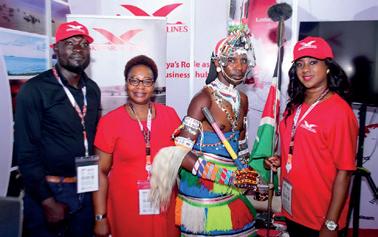

Gerton Investment Group is a diversified real estate company specialising in Property Development, Investment, and Asset Management.
With a focus on integrity, innovation, and sustainable growth, the company continues to play a pivotal role in shaping Kenya’s property market through quality developments and trusted investment solutions.
Mr Kirui offers the best of 15 years in real estate business in Kenya and makes him unique having worked with the biggest companies in Kenya.
“This will be the first time an inflight magazine will have a dedicated space for property segment and will give real estate companies a platform to showcase their products to a wide range of people.
For property sector advertising opportunities, please contact Mr Kirui Gideon
Email: gkirui@gertonltd.co.ke www.gertonltd.co.ke
In an exciting new development for Kenya’s real estate and investment landscape, Gerton Investment Ltd, under the leadership of the Director Gideon Kirui, has entered a strategic partnership with Angani magazine to create a regular feature dedicated to real estate and property development.
Over the years, Gerton Investment has earned a strong reputation with a portfolio that spans prime urban and suburban locations. The company remains committed to creating sustainable, high-value developments that meet modern housing and commercial needs.
According to Mr Kirui: “Real estate is about building trust, opportunity, and lasting value. Through this partnership with Angani magazine, we aim to share stories that inspire and inform both investors and homeowners across Kenya.”
The upcoming features in Angani, produced in partnership with Gerton Investment, will include:
Insightful articles on property investment trends and market growth opportunities
Profiles of emerging developers, realtors, and financiers
Spotlight on construction equipment, trucks, and machinery
A curated section showcasing innovative housing projects, land deals, and investment zones
Legal insight into the real estate market by legal team and researchers
This section will serve as both a guide and inspiration to investors, homeowners, and developers seeking to understand the dynamics of Kenya’s fast-growing real estate market.
Through this partnership, Mr Kirui continues to position Gerton Investment as a forwardlooking enterprise committed to economic empowerment and industry development.
New movie Bus 338 has as many twists and turns as the long-distance coach ride that is its central setting. The thriller is the first release by production company SNT and showcases a host of East African talent in front and behind the camera. The film’s Kenyan actor and producer Serah Ndanu and its Tanzanian screenwriter Angela Ruhinda unpick their creative processes and reveal what it is they love about single-location dramas.
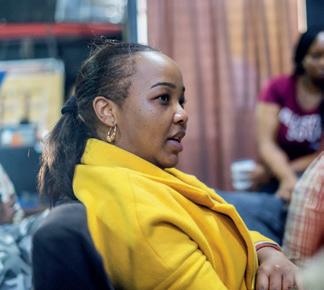

The Kenyan actor has appeared in films such as The Rugged Priest, Noose of Gold, and Igiza. She is also the founder of SNT Productions Ltd. Bus 338 marks her debut as a film producer.
Q: The plot of Bus 338 centres on strangers trapped on a broken-down long-distance
bus during the outbreak of a deadly virus. How did the idea come to you?
The seed of Bus 338 was planted during the 2020 lockdown while I was visiting the UK. That period brought an unprecedented sense of isolation and uncertainty. I was deeply struck by how a single event, in this case, a virus, could change human behaviour overnight. I began to imagine what it would be like if a group of strangers were forced to

be together while danger loomed outside. It’s that collision of fear, survival, and shared humanity that inspired the story.

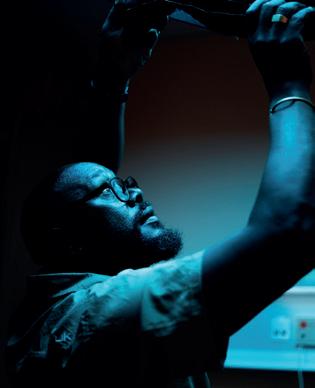
Q: The film is set to have premieres in both London and Nairobi. Can you share details? London felt like the natural choice for the premiere because it’s a city that embraces diverse voices and global stories, and it has a thriving African diaspora community. For Kenyan audiences, we’re planning an exclusive premiere followed by a wider cinema release. Kenya is at the heart of this story, and it’s very important to me that the film is experienced on the big screen back home.
Q: Why were you drawn to the thriller genre? Thrillers have a way of cutting straight to the human condition by stripping away the polite layers of society. As an African storyteller, I find that incredibly powerful. We have so many untold stories on this continent that lend themselves naturally
to the thriller format: real stakes, complex people, moral tension. It’s an exciting time to be part of this genre’s evolution in Africa.
Q: The film is mostly shot onboard the bus. How do you feel that heightens the tension of the story?
Shooting primarily inside the bus allowed us to create a sense of claustrophobia and mounting tension. That environment amplifies conflict and intimacy in equal measure, which was crucial for the story we wanted to tell.
Q: There is a long cinematic tradition of single-location thrillers. Were there any films in particular that influenced you in the making of Bus 338?
I love classic single-location thrillers like Red Eye, The Taking of Pelham 123, and even Phone Booth. They’re masterclasses in pacing, suspense, and character dynamics. Those films influenced how we approached the rhythm of Bus 338. We wanted the tension to build steadily.
Q: Long-distance bus rides are a slice of life that many East Africans will be familiar with. Why did you choose that mode of transport in particular?
Long-distance bus rides are such a familiar and nostalgic part of East African life. They’re places where stories collide. A bus is also a liminal space: you’re not quite at your destination, and anything can happen in between.
Q: Your production company SNT aims to showcase African talent. How impressed are you by the wealth of cinematic talent in East Africa?
I’m incredibly proud of the team behind Bus 338. We worked with a Kenyan cast, a Tanzanian screenwriter, and a brilliant Kenyan director, Isaya Evans. The depth of
We have so many untold stories on this continent that lend themselves naturally to the thriller format
talent in East Africa is extraordinary. We have world-class storytellers, technicians, and creatives. My goal through SNT Productions Ltd is to help spotlight that talent on global platforms. Bus 338 is just the beginning.
Q: You play one of the lead characters in the film – a role that was based on your sister. How did she inspire you?
Yes, my character was inspired by my elder sister. who is a medical practitioner. I’ve always admired her sense of duty. nurses don’t really have ‘days off’. Whenever they’re needed, they step up. During extreme moments like the Covid pandemic, I watched her and so many others put their own lives on the line to save strangers. I channelled those qualities into the character.
Q: How was juggling being producer and actor on set?
Wearing both hats meant that my focus had to shift constantly from performance to logistics, from emotional depth to practical decisions. It was challenging but also incredibly rewarding. I had a strong team supporting me, which allowed me to fully inhabit the character while steering the bigger picture of the film.
Tanzanian Angela is a screenwriter, playwright and award-winning film producer. She is the co-founder of the Dar es Salaambased Black Unicorn Studios, which brought Binti and The Christmas Run – both scripted by Angela – to the big screen.
Q: When Serah brought the idea for Bus 338 to you, what was it that made you want to write the script?
It was clear from the beginning that this story really meant a lot to Serah and she was very passionate about it. I also really loved the idea of writing a movie that happens in a short span of time and in mostly one location. It was an easy sell.
It was a very collaborative process for Serah and me. There was some brainstorming over the phone before I went into treatment and scripting. The core of the story remains Serah’s baby; I helped put

some meat on the bones and fill out the world more.
Q: You’re an award-winning scriptwriter, but in most of your past work the focus has been on romance and comedy. Did you enjoy being out of your comfort zone writing a thriller?
I really enjoyed working in another genre. It’s a genre I’ve been curious about yet equally terrified of diving into. The challenge was raising the stakes for the character in such a confined setting, but I got creative, and I hope it paid off.
Q: With Bus 338 you have a bus-load of characters, all with their own back story. How was that to navigate?
I submitted a treatment to Serah before writing the script where I broke down all the character journeys so that we made sure we knew where everyone’s arc was before scripting. This made it easier for us to track
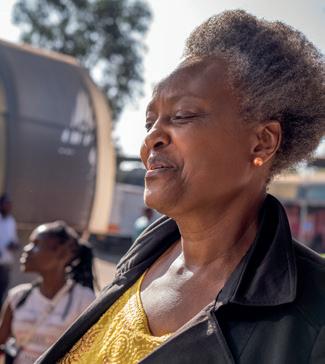
all storylines and to see if any storyline was lacking.
Q: Was the single setting of the bus a test or a release for your creative skills?
It was definitely a challenge, but I found new ways to create tension and drama by using the character’s polarising personalities against each other.
Q: Your script switches from English to Swahili to Sheng. Was that important to get a sense of authenticity and represent the different backgrounds of characters? As a Tanzanian, how is your Sheng?
Authenticity is very important when it comes to East African films and language plays a big part. Because I’ve started doing so many Kenyan projects, I have picked up some sheng! However, I usually write the scripts in English and later, a consultant will come in and translate to Sheng for the characters who speak it.

Eldoret is one of the best destinations in the world for tea lovers. Nilpa Shah reveals how the mountain town is capitalising on the tourist appeal of its tea plantations.
West of the Great Rift Valley, in the highlands surrounding Eldoret, lie the fields that power one of the country’s most powerful agricultural engines – tea. Some of the world’s most distinctive teas, known for their bold flavour and rich colour, are grown across Nandi, Kericho, and Bomet counties. At the centre of it all is Eldoret – a key town that serves as a hub for tea processing, trade, and transport. Here, tea isn’t just a crop. It’s a way of life.

This region has all the right ingredients. High altitudes, cool temperatures, consistent rainfall, and fertile volcanic soils give the tea grown here a flavour profile that is hard to match. The slightly acidic pH of the soil adds to the leaf’s depth and richness, resulting in a clean, brisk cup that’s become Kenya’s signature around the world.
Thanks to the equatorial climate, tea here grows year-round. Steady plucking cycles produce fresh, high-quality leaves
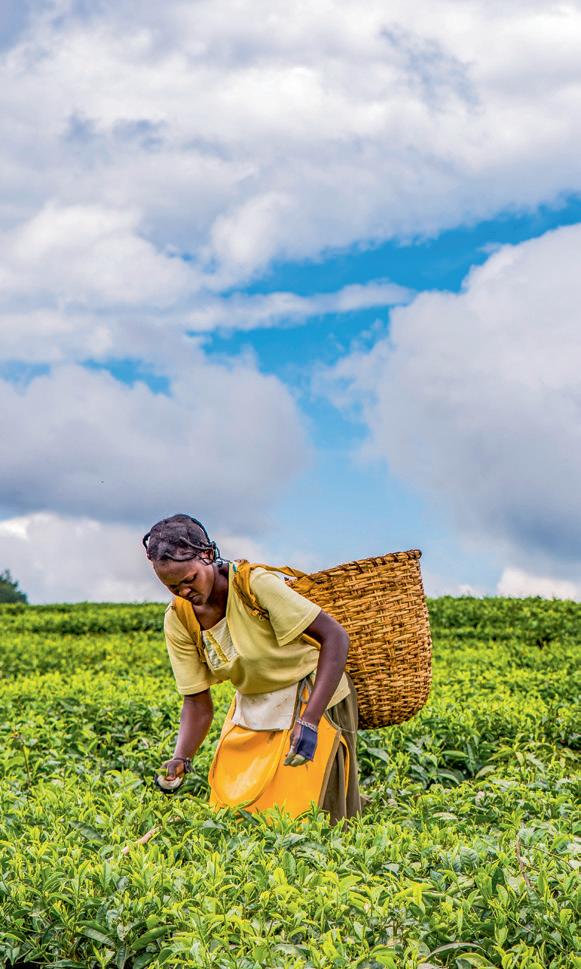

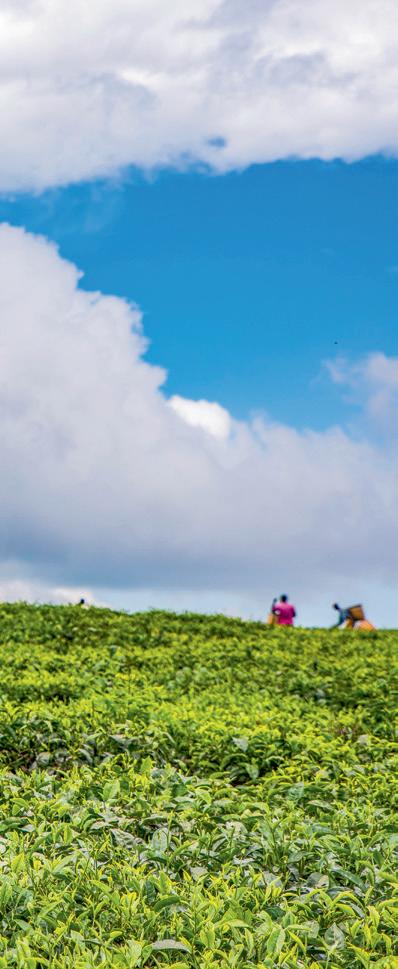
that go from bush to cup with remarkable consistency.
The landscape here is a mix of large tea estates and thousands of smallholder farms. The plantations have the scale and the technology to process high volumes while small-scale farmers; many owning just a few acres, hand-pick leaves daily and deliver them to nearby factories or co-operatives.
Together, these growers supply a wide range of tea grades. The black tea produced here is mostly processed using the cut-tear-curl method, which is ideal for strong brews and tea bags. One standout is Orange Pekoe One, a premium leaf with long strands and a refined flavour.
Secondary tea grades also play a vital role. Though less glamorous, these finer particles power the world’s most popular tea bags. They deliver fast colour, strong taste, and that unmistakable Kenyan punch.
There’s also innovation in the mix. Purple tea – a newer variety – offers a lighter taste and extra antioxidants. It’s catching attention in global wellness circles and among curious sippers looking for something different. Its light, floral notes set it apart from traditional brews. Grown in small batches, it’s not just healthy, it’s also rare, refined, and ready for global shelves.
Eldoret is the perfect base for travellers looking to explore tea culture up close. A short drive from town takes you deep into tea country, where meticulously arranged rows of emerald tea bushes stretch across rolling hills. The views are stunning, but the real magic lies on the ground.
Visitors can walk the fields with local farmers, learn how tea is plucked, and follow the process through to drying and packaging. Smallholder farms offer a more personal look; where you’re not just touring, you’re having a conversation. You’ll hear how tea has shaped families, fed communities, and built futures.
Factory visits are eye-opening. You’ll see rows of withering leaves, feel the warmth of fermentation rooms, and watch sorting machines at work. Tasting sessions are often included – an opportunity to try different grades side by side, guided by experts who know their leaves inside out.
And yes, it’s common to be offered a cup at the end of every visit. Kenyan hospitality runs deep, and around here, tea is always the first thing on the table. In this corner of the world, arrivals are often marked by a cup of tea, quietly offered and deeply felt.
New Airbnb stays are popping up across tea farms. These hideaways offer a digital detox, local food, and misty morning brews straight from the source. It’s tea tourism reimagined – perfect for wellness seekers chasing peace, quiet, and flavour.
In the Eldoret region, tea is part of the daily rhythm. It’s brewed early in the morning, shared with neighbours, sipped during meetings, and enjoyed as a quiet moment at day’s end. It’s strong, straightforward, and satisfying – just like the people who grow it.
Whether you’re a casual drinker or a devoted connoisseur, a visit to this part of Kenya gives new meaning to the cup you hold in your hands. You taste the land, meet the hands behind the harvest, and feel the culture in every sip.
Fly Skyward Airlines to Eldoret and experience the region where Kenya’s most flavourful tea is grown, crafted, and shared.
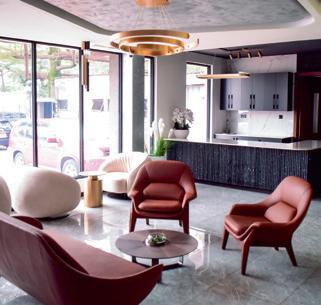
Skyward Airlines’ Ebari VIP Lounge reimagines the pre-flight experience as a time of pleasure and relaxation.
The Ebari VIP Lounge welcomes all departing guests, regardless of class or destination. Whether you're embarking on a business expedition or a family adventure, our doors open to offer you a refined escape from the ordinary airport experience.
The Ebari VIP Lounge welcomes all departing guests, regardless of class or destination. Whether you're embarking on a business expedition or a family adventure, our doors open to offer you a refined escape from the ordinary airport experience.
In partnership with the Angani Bistro, we present a culinary journey that celebrates both international flavours and authentic Kenyan cuisine. Our ever-changing menu features: artisanal sandwiches and ovenfresh bread and pastries handcrafted daily using premium ingredients as well as salads and premium beverages.
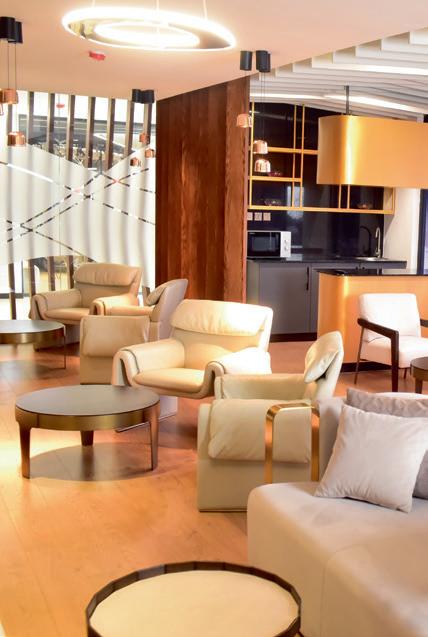
Ebari features plush leather seating arranged in intimate clusters, perfect for solo travellers seeking solitude or colleagues conducting last-minute meetings. High-definition screens provide real-time flight updates and entertainment, while floor-to-ceiling windows bathe the space in natural light.
Features include complimentary unlimited high-speed WiFi throughout, local and international newspapers and magazines

updated daily, charging stations at every seat, and curated background music to create a tranquil atmosphere.
We understand that young travellers have different needs. Our dedicated children's play zone features age-appropriate activities and toys in a secure, supervised environment. Parents can relax nearby while children expend their pre-flight energy in a safe, engaging space.
Our thoughtfully designed nursing area provides mothers with a comfortable,
quiet sanctuary. Equipped with plush seating, soft lighting, and all necessary amenities, it's a serene space for feeding and caring for infants away from the bustle of the terminal.
For travelers who demand more, our exclusive Business Centre elevates the lounge experience to unprecedented heights.
The VIP area features state-of-the-art ergonomic workstations, private meeting pods, and contemporary furnishings that blend form with function. High-speed business-grade internet, ensure you remain entertained and productive until the moment you board.
VIP privileges include access to premium Business Centre facilities, complimentary gourmet meals and beverages, private shower suites, priority boarding privileges and a dedicated concierge service.
For those seeking the absolute pinnacle of airport luxury, our VVIP section offers an unparalleled sanctuary. This ultra-exclusive space features dedicated staff attending to your every need, spa-quality bathrooms with rainfall showers, Luxury Toiletries, and plush toweling, a chef-curated menu with à la carte options, and concierge services from last-minute travel arrangements to ground transportation.
Access to the VIP and VVIP sections is available at a modest fee that transforms your pre-flight hours into an experience worth remembering.
Our spacious banquet area serves as the perfect gathering spot for small groups and families. Share a meal, swap travel stories, or simply enjoy each other's company in an atmosphere that feels more boutique hotel than airport terminal.
For solo travellers, our individual leather armchairs offer the perfect retreat – sink in with your favorite beverage, catch up on reading, or simply watch the world prepare for flight.
At Ebari Lounge, we believe your journey should begin the moment you step through our doors. Every detail – from the aroma of fresh coffee to the softness of our seating, from the attentiveness of our staff to the quality of our cuisine – has been carefully curated to ensure your comfort.
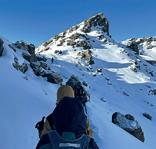
High above the clouds, where the snow-capped peak of Mount Kilimanjaro touches the sky, a remarkable Tanzanian initiative is rewriting the story of environmental protection and cultural unity - Guardians of the Peak.
Launched in 2024, Guardians of the Peak is a ten-year international environmental and cultural documentary project under Ram Films Company. The project is dedicated to protecting Mount Kilimanjaro Africa’s highest peak from the growing threats of climate change, while promoting sustainable tourism and clean energy awareness.
Season One carried the theme “Embrace Nature, Protect Tomorrow” and it set a strong foundation for this national and global campaign.
The premiere was held at Century Cinema, Mlimani City in Dar es Salaam, attended by over 368 guests, including government leaders, institutions, and key industry stakeholders. The event marked a milestone for Tanzanian filmmaking and environmental
storytelling, drawing local and international recognition.
Through film, education, and collaboration, Guardians of the Peak aims to inspire people to protect the environment while showcasing Tanzania’s unmatched natural beauty and cultural heritage to the world.
At the heart of Guardians of the Peak are two dynamic Tanzanian visionaries whose passion bridges creativity, diplomacy, and sustainability.
Ram Ally K.
Director & Founder of Guardians of the Peak Founder of Ram Films Company, Ram Ally K. is an award-winning filmmaker, writer, and
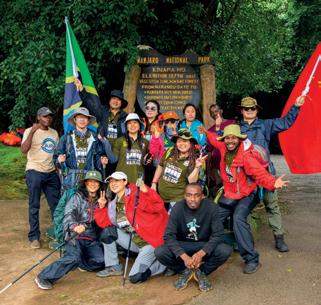
director known for using film as a catalyst for social and environmental change.
He is best known for his film “NYARA: The Kidnapping”, which became Tanzania’s first Netflix-featured movie earning international acclaim and multiple awards locally and abroad.
With Guardians of the Peak, Ram continues his mission to create powerful stories that connect people and inspire a sense of responsibility toward nature. His vision is to position Tanzania as a global leader in creative storytelling for sustainability.
Elizabeth Mrembo (Shuyan Wang) Project Supervisor & International Coordinator
Elizabeth is a Tanzanian with Chinese heritage and currently serves as Head of the Chinese Desk Department at Equity Bank Tanzania. She is a bridge-builder between Tanzania and China, playing a vital role in fostering partnerships and cross-cultural collaborations.
Her deep understanding of both cultures has been essential in strengthening ties between institutions, businesses, and creative sectors in both nations. Under her coordination, the project has successfully engaged with Chinese partners and inspired cross-border environmental cooperation.
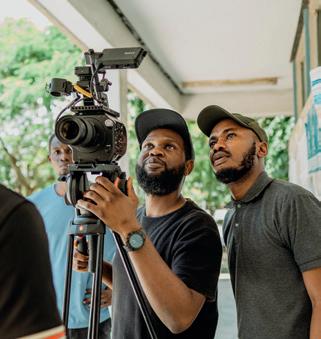
Guardians of the Peak – Season One achieved outstanding success both as a documentary and as a movement. The project collaborated with major national and international partners including:
The Embassy of China in Tanzania, Tanzania Film Board, Tanzania China Friendship Promotion Association (TCFPA), Zara Tanzania Adventures, TANAPA, and Tanzania Forest Services (TFS).
Its message “Embrace Nature, Protect Tomorrow” resonated deeply across
audiences, emphasizing the importance of environmental conservation, cultural pride, and sustainable tourism.
Season One not only raised awareness about climate change impacts on Mount Kilimanjaro but also inspired youth participation and cross-cultural understanding. The documentary has since been showcased at international festivals and continues to be used as an educational tool.
Now in motion, Season Two introduces a new theme “Embrace Clean Energy, Protect Tomorrow.”
This season expands the collaboration beyond Tanzania and China by introducing India as a new participating partner, fostering a wider cultural and environmental network across continents.
Guardians of the Peak – Season Two will feature clean energy demonstrations, environmental education campaigns, and
a climbing expedition from 2nd to 11th December 2025, followed by the grand Premiere at The SuperDome, Masaki on May 1st, 2026.
Key partners confirmed for Season Two include Skyward Airlines, Meticulous General Insurance, Titan Tanzania, Red Gold Tanzania, Cosota, King Jada Hotel, Tan Management Insurance Brokers, All Top Electronics, TCFPA, and The Embassy of China in Tanzania among others.
Over the next decade, Guardians of the Peak aims to build a legacy that merges environmental action with cultural pride and creative storytelling. Through films, youth challenges, and global partnerships, the project seeks to ensure that Mount Kilimanjaro the crown of Africa remains protected for generations to come.
As the journey continues, one powerful message echoes from Tanzania to the world: “Let’s go together - nobody stays behind.”
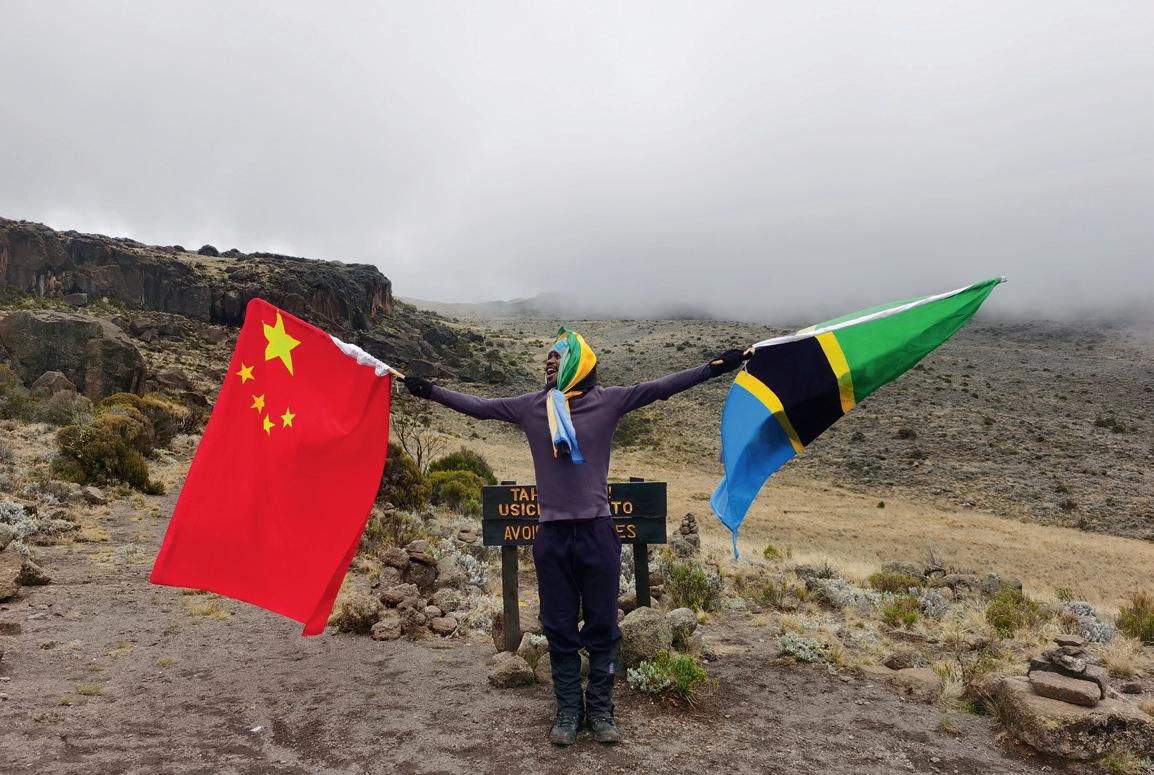
both as a documentary and as a movement
Podcasts are becoming a significant force in popular culture in Africa, appealing to a tech-savvy audience hungry for content that reflects their daily realities, humour, and aspirations. Harriet James selects five of the best podcasts to get your fix of tech, true crime, pop culture, or comedy.

The Kenyan podcast space is expanding at an impressive pace, driven by young, urban, and tech-savvy audiences hungry for content that reflects their daily realities, humour, and aspirations. With rising internet penetration, affordable smartphones, and a growing culture of on-demand entertainment, podcasts are filling gaps left by traditional media. From comedy and travel to relationships, technology, and music, Kenyan podcasters are building communities that not only entertain but also inform and inspire.

These shows create communities, amplify voices often missing from mainstream platforms, giving space to youth, women, and creatives who want to speak freely.
Few shows capture the spirit of Kenya’s digital youth like The Sandwich Podcast. Known for its mix of humour, storytelling, and bold commentary on everyday life, the podcast has become one of the most listened-to shows among millennials and Gen Z. Hosted by Owen Njuguna, Tony ‘Tonio’ Kibet, Joan Melly and George Nyamita, the show thrives on unscripted banter that mirrors the funny, sometimes outrageous conversations you’d hear in matatus or at house parties. With over 1.5 million listeners on Spotify, The Sandwich appeals to young listeners because it provides a space to laugh at the absurdities of life in Kenya,

from dating mishaps to internet trends. For many, this is not just entertainment but a validation that their lived experiences are worth talking about, and worth laughing at.
Another wildly popular Kenyan series that delivers a potent mix of humour, candid conversation, and cultural commentary. Additionally, it ranks as one of the moststreamed podcasts in Kenya on Spotify. Hosted by Chaxy, Mariah, and Mwass, the podcast has built a highly engaged and loyal community, as seen during their 24-hour live stream celebrating 100,000 YouTube subscribers.
Kenya’s top-streamed podcast explores the many facets of love from the first meet cute to loss, heartbreak, and the journey toward self-discovery. Hosted by Julia Gaitho, each episode features guests sharing deeply personal stories, sometimes anonymously, about relationships that shaped who they are today.
This podcast hosted by Adelle Onyango is more than just celebrity storytelling. It has built its own community by offering unfiltered conversations about resilience, identity, and life transitions. Adelle’s storytelling resonates deeply with women and young professionals who see themselves in her guests’ struggles and triumphs. The show’s impact lies in how it humanizes public figures, showing their vulnerabilities and journeys beyond the spotlight.
ManTalk KE is aimed at ‘men who love honest conversations about masculinity, personal growth and navigating modern relationships’. Hosts Eli Mwenda and Oscar D. Koome have created one of Kenya’s most influential lifestyle podcasts by carving out a rare and refreshing space for men to speak openly and honestly. Unlike many platforms that reinforce stereotypes, the podcast focuses on emotional vulnerability, personal growth, and social responsibility which makes it both relatable and transformative for a wide audience. With more than 150,000 listeners spread across Kenya, South Africa, the UK, and the US, the show consistently ranks among the top 10 most streamed podcasts in Kenya.
This podcast has become Kenya’s premier source for tech news, startup insights and industry updates. Hosted by tech journalist Nixon Kanali, the show delivers weekly deep dives into Africa’s emerging technologies, featuring interviews with founders, investors, and innovators driving the continent’s digital transformation
Few podcasts dive deeper than Cleaning the Airwaves (CTA) by Richard Njau. Known for its marathon interviews, which sometimes last for hours, the show chronicles the journeys of Kenyan musicians, producers, and industry insiders. From pioneers of the 1990s to rising stars of today, CTA is an oral history of Kenya’s music scene. While it’s a chance for the diehard fans to learn the backstories behind hit songs, for the wider public, it’s cultural preservation and a way of honouring Kenyan music and ensuring its stories are not lost.
With rising internet penetration, affordable smartphones, and a growing culture of on-demand entertainment, podcasts are filling gaps left by traditional media
TMI
Better known as The Messy Inbetween, this trailblazing podcast is hosted by the dynamic duo of Murugi Munyi and Lydia K.M. The show has built its reputation on being unapologetically honest and refreshingly unfiltered. Each episode dives deep into the realities of modern life, covering everything from the complexities of dating and friendships to the pressures of career growth, financial independence, and social expectations. What sets it apart is its raw, candid style that refuses to sugarcoat the struggles many young women face, while still offering humour, warmth, and encouragement. With over 50,000 monthly listeners and a thriving digital community of more than 100,000 Instagram followers, TMI has grown beyond just a podcast into a lifestyle brand that empowers its audience to embrace authenticity, vulnerability, and self-discovery.

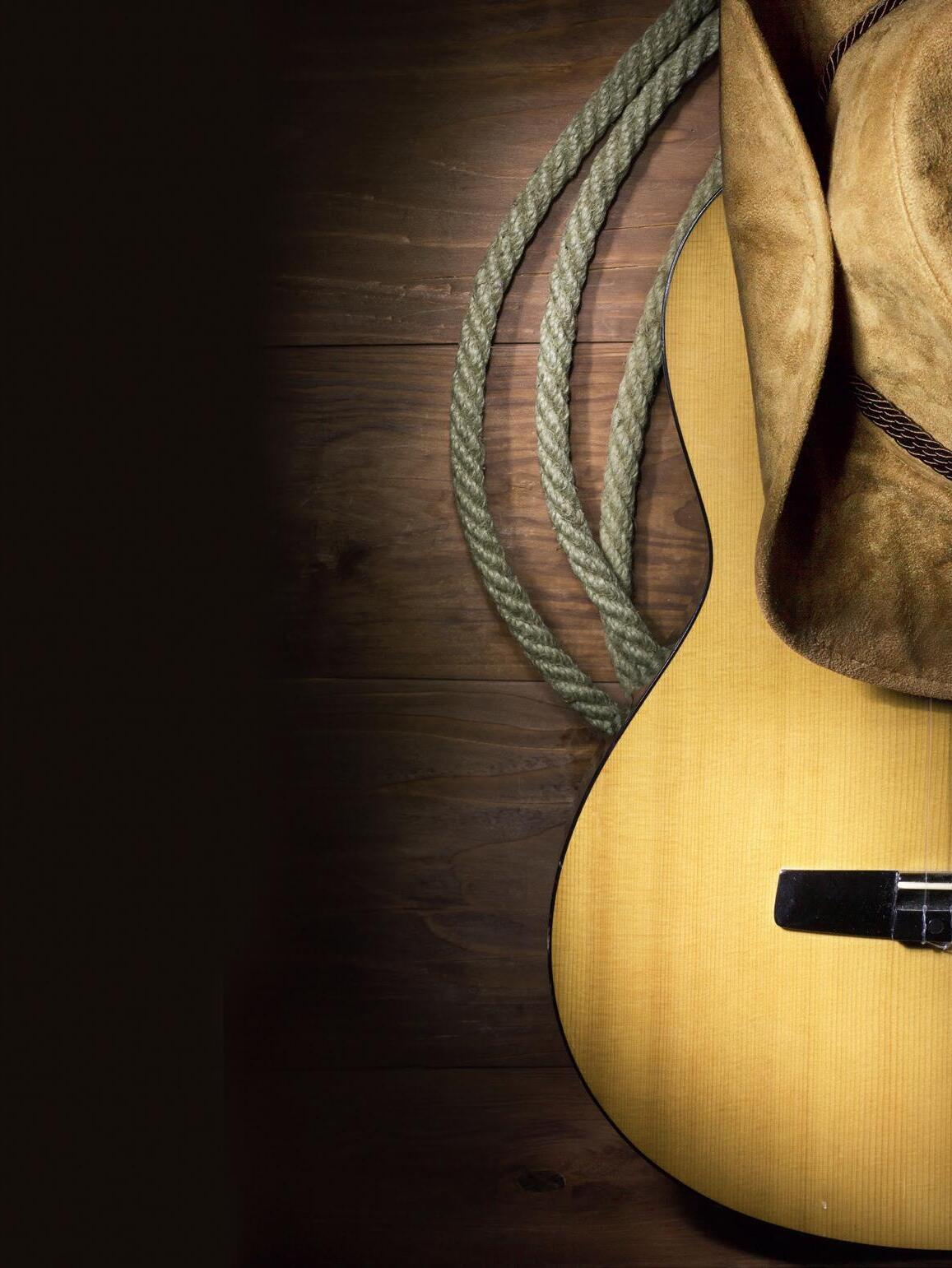
‘My father bought me a Stetson
The annual International Cowboy and Cowgirl Day is held in Nairobi, not Nashville. Country music and its associated fashion is growing in popularity in Kenya. John Knight – known on the scene as ‘Sheriff Knight The Dancing Cowboy’ – is a popular figure on the scene with his silky moves leading line dance nights across the country. He talks to Angani about how country music has fascinated him since childhood.
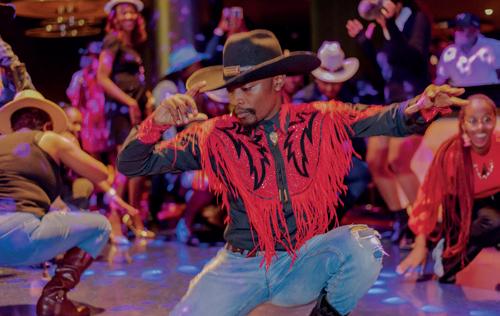
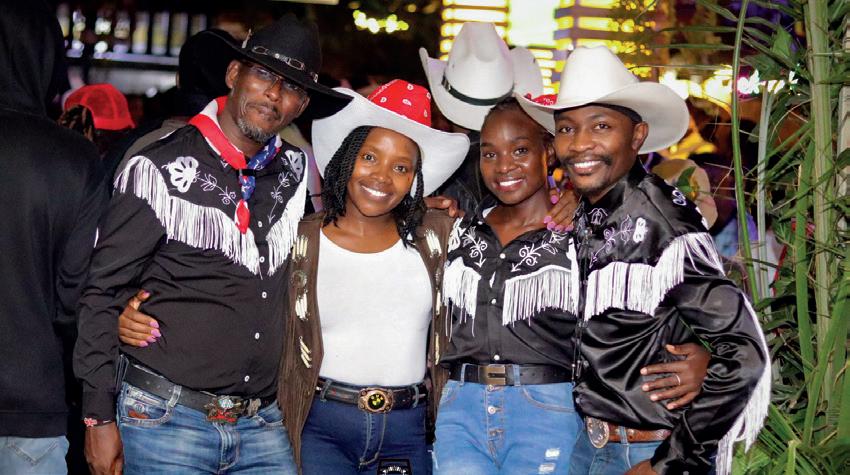
Q: Just how big is country music in Kenya? It is rising at a high rate. Country music in Kenya is far from niche. It is a well-established and culturally adopted genre, particularly prominent in Nairobi and rural communities. With star figures like Sir Elvis, thriving local artists, dedicated radio shows, and packed events, Kenya may host the largest country music scene in Africa. And while some see it as ‘old school’, many younger fans are rediscovering and reshaping it into a Kenyan expression of storytelling and community.
Q: When did you start getting interested in country music?
I got my first Stetson as a gift from my late father. He was the one who inspired my love country music. I can remember how he used share how the song lyrics shared stories and real-life experiences. It began my 15-year love affair with country music.
Q: What is it about country music and the cowboy style that appeals to you? There is no culture without identity. My cowboy style identifies with my love for the country music genre.
Q: Is Nairobi the centre of Kenya’s cowboy/
In country culture, the look is almost as important as the music because it sets the whole vibe
country music scene? Yes, simply because a big city like Nairobi is home to so many different people with different interests so it's quite easy to foster innovation and new experiences.
Q: Is the look just as important as the music? Where do you get your cowboy clothes? In country culture, the look is almost as important as the music because it sets the whole vibe. When people see boots, hats, denim, and boleros, they instantly know they're stepping into a western-themed experience, even before the first song plays.
Q: Who are your favourite country music artists?
For home-grown talent is has to be Sir Elvis. Among American artists I like George Strait, Alan Jackson, Don Williams, Tanya Tucker, Johnny Cash, and not forgetting Charley

Pride. The list is endless and depends on my current mood. Like now if you ask me, I would tell you can tell you the ‘Possum’ George Jones, but next week maybe it will be Waylon Jennings.
Q: Were you always a good dancer? Yes, funny thing some moves just come automatically and dancing is something that I’m addicted to.
Q: What do you like about line dancing?
The social aspect is huge, but it’s also about unity, the shared rhythm, and that rush when everyone nails the step together.
Q: If someone comes to Nairobi and wants to get a flavour of the country music scene and try line dancing, where should they start?
Just holla at me through my social media pages @sheriff_knight on Instagram and

dancingcowboy on tiktok and finally enroll @Kenya country dance club.
Q: International Cowboy Day was celebrated in July this year at the Ngomng Racecourse in Nairobi. What are your memories of the day?
It was a Saturday full of foot-stomping line dances, heartfelt songs, family smiles, and African cowboy pride. This fusion of cultures celebrated not just music, but shared values in storytelling, faith, and community. Given the buzz, planning, and passion behind it, International Cowboy and Cowgirl Day has strong potential to become a beloved annual event in Nairobi and perhaps across the region.
Q: Sir Elvis also performed at the event? As leading lights in. Kenya’s country music
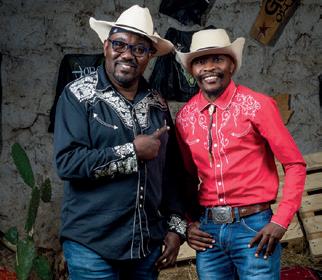
scene, how well do you know each other?
I have known Sir Elvis for the past 15yrs and I can tell you he's been an inspiration to me and many other country music lover., He has been a mentor of sorts and we have travelled together to may events, including this year’s 4th of July event at the US Embassy in Nairobi where I led the dancing. He is the
reason I am who I am today. Hats off to the king of country music in Kenya, Sir Elvis.
Q: What is the first line dancing step you usually teach beginners?
The two step dance. It is simple and rhythmic and helps novices get the feel of the music.
Q: Kenya has cowboys, does it also have cowgirls? Are there lots of women on the country music scene as well?
Yes, of course, Actually there are more cowgirls than cowboys.
Q: How does Sheriff Knight make a living from dancing and country music in Kenya? Marketing and branding, influencing, hyping, selling merchandise, and finally dance training. It’s a good life.
The Kenyan capital’s social scene is constantly evolving. Travel influencer and Nairobi native Embukane Libosso reveals his current favourite hangouts.

Formerly Pallet Café and Traventure, Sage Delicacy in the affluent Nairobi neighbourhood of Gigiri impressed me not just with food but with the spirit of rebirth. Great plates, genuine service, and now live music and events – it’s a venue that carries warmth. As we left, the manager asked kindly for a Tripadvisor review. I told her I’d try to do better. Perhaps this is it.
Known affectionately as Nairobi’s new “mecca for live music,” Geco Café feels like a pilgrimage. I went to catch musician and artist Coster Ojwang perform with The Fisherman Band. His new EP Mbak Ndalo
(‘Ancient Tales’ in Luo) is more than music. What unfolded wasn’t just performance, it was communion.
The Festival of Sound and Art (FOSA) is a celebration of Kenyan music and art held at the Sarit Centre in Westlands, in August. Organised by Sarit, the event features live performances by Kenyan artists, art displays, and family entertainment. Headliner Mbithi Masya voice lit up the event like firework while Kenyan writer Mordecai Ogada’s spoken-word set unfolded like prayer. For a fleeting moment, Nairobi breathed in harmony.
This quiet gem left its mark. I arrived as Nairobi’s Ethiopian community broke their 16-day fast, preparing for their new year. Injera spread across tables, coffee perfumed the air, and laughter rose like incense. Renewal lived in every sip, every shared plate.
The reopening of Alliance Française Kisumu inside the Mama Grace Onyango Cultural Centre marks a return to connecting Luo talent to international opportunities, weaving Kenyan voices into Francophone dialogues.
At the top of Nairobi’s playlist is Blinky Bill. His latest release, Bella, features the soothing melodies of Lisa Oduor-Noah. The single and visuals weave infectious rhythms with insight, echoing Nairobi’s own layered pulse. Blinky Bill (Bill Sellanga) is a DJ, producer, and founding member of experimental Kenyan group Just A Band, whose music encompasses jazz, hip-hop, disco, and electronica.
Step into Saffron Garden, a boutique retreat tucked away in the heart of Malindi, one of the most enchanting destinations on Kenya’s coast. Set within a lush five-acre oasis, its 15 beautifully designed bungalows offer the perfect blend of nature, art, gastronomy, and tradition - creating a sanctuary for rest, reflection, and discovery.
This unique hideaway has become a favourite gathering spot for travellers seeking peace of mind, inspiring activities, and a true taste of Malindi’s coastal charm.
We’re delighted to announce that Saffron Garden has partnered with Angani to offer one lucky reader an unforgettable two-night stay for two people. The winner and their guest will also enjoy an outdoor movie night and dinner under the stars during their stay.
To enter, simply email a photo of yourself holding this issue of Angani onboard your Skyward flight to competition@landmarine.org before 12 January 2026. Please note: Flights to and from Malindi are not included in the prize.
Terms & Conditions: Prizes are subject to availability. One entry per person. Entrants must be aged 18 or over. The organisers’ decision is final. The competition is not open to employees (or their relatives) of Skyward Airlines, Land & Marine Publications Ltd, or Saffron Garden. Prize excludes flights to and from the destination. Images are for illustrative purposes only. Competition closes January 14 2026. Winners will be contacted directly and announced in the next issue of Angani.
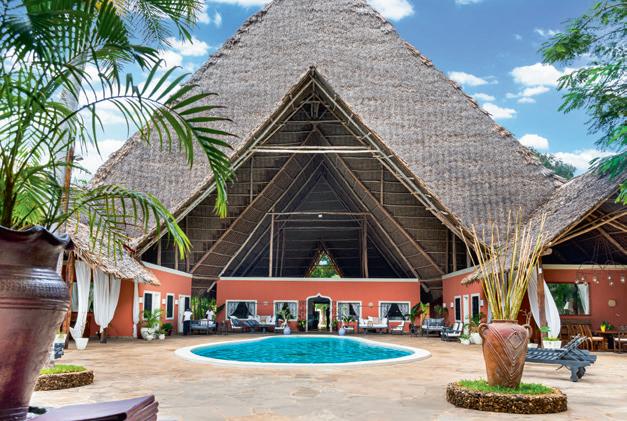

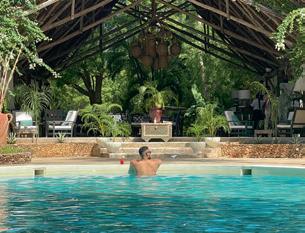
Congratulations to Mohamed Zahir Nazir who wins an all-inclusive three-night stay at Watamu Treehouse, Kenya.
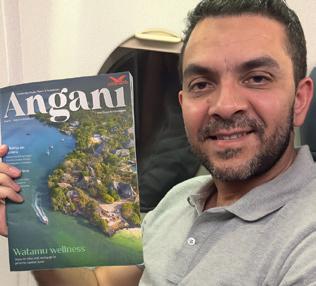
After dominating the first-ever African Rafting Championships and now set to compete against the world’s best in Argentina, Kenya has proved itself an emerging force in the sport. William Kinuthia, the general secretary of the Kenya Rafting Federation, promises there is much more to come.
In July this year Kenya won all six gold medals at the first African Rafting Championship. The clean sweep means Kenya qualifies as the only African nation at the Senior World Rafting Championships to be held in Argentina from November 3 to 9.
It's a landmark achievement made all the more impressive by the fact that white water rafting was only recognised as a professional sport in Kenya in 2024.
William Kinuthia, the general secretary of the Kenya Rafting Federation (KRF), is understandably proud of the achievement, but adds that it is “just the beginning”. The KRF was launched in early 2025 as the national governing body of the sport and aims to nurture young talent and establish Kenya as a global leader in the sport.

Kinuthia’s roadmap for raising the sport’s domestic and international profile includes Kenya being selected as host nation for next year’s world champs. An official decision on which country is assigned is just weeks away when Kinuthia and I speak on the phone.
He is hopeful the country’s bid is successful and that the 2026 event can be held in May or June when East Africa’s long rainy season raises river levels.
Kenya’s bid is strengthened by having an established championship-level location for white water rafting. The small town of Sagana in the Kenya’s Central Province is dissected by the roaring waters of the Tana River. “It is the best course in Africa,” says Kinuthia. The river has a variety of rapids and a 14km unbroken stretch of water meaning it can cater to the three championship rafting disciplines: slalom, RX knockout race and downriver endurance.
The recent African Rafting Championships were held in and the town also hosted African Olympic qualifiers for Beijing in 2008 and Rio de Janeiro in 2016. “Many African rivers are too big for white water rafting with extremely powerful rapids and large water volumes,” Kinuthia says. “Sagana’s rapid areas are Grade 2 to Grade 5, depending on

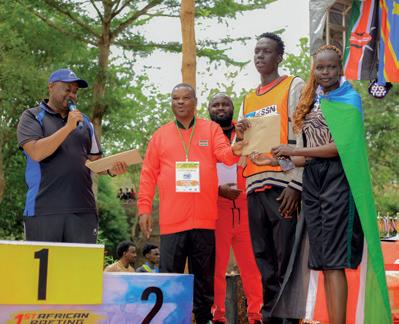
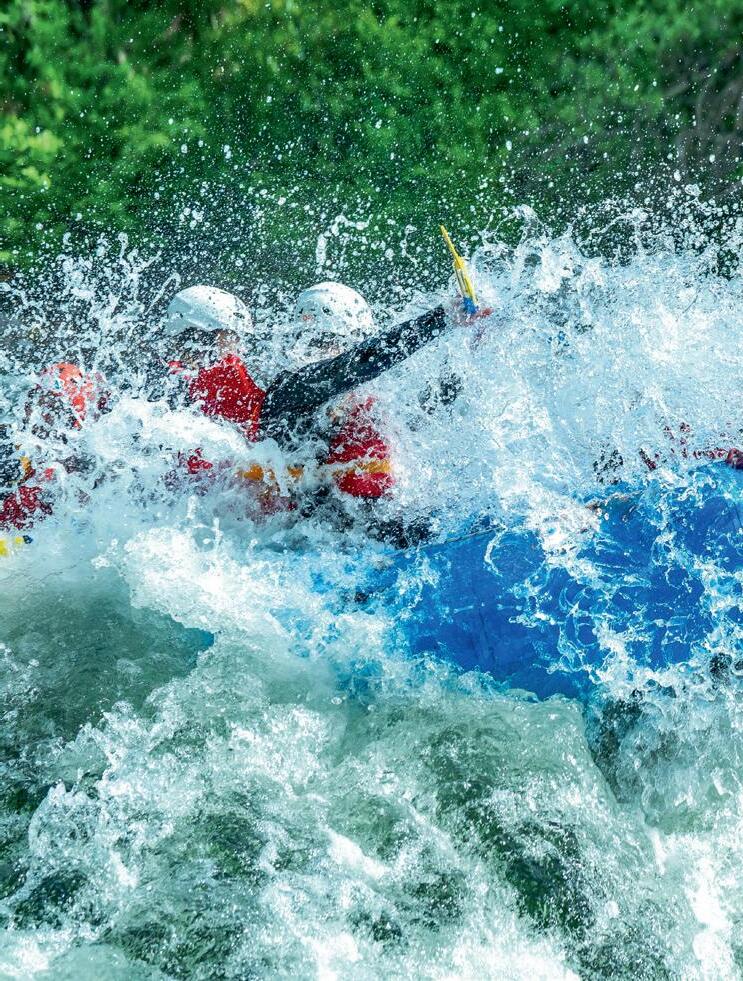
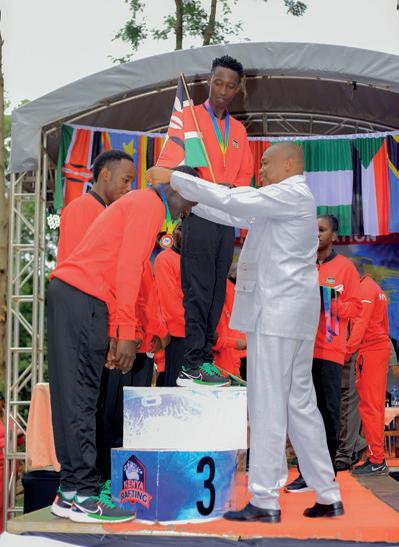
the season, so are suitable for beginners to professionals. This stretch of the river also has no dangerous wildlife such as hippos and crocodiles.”
Sagana also has the infrastructure in place to support a grand-scale international event. The town – which is about a two-hour drive from Nairobi – has for decades been a hub for adventure sports in Kenya with rock climbing, bungee-jumping, and zip-lining complementing the white-water rafting opportunities. To cater for the sports tourism traffic, plenty of riverside hotels and resorts have sprung up. Such a wealth of hospitality options is ideal for an event such as the World Champs with competitors from around 100 countries taking part. Kinuthia points out that accommodation for athletes is proving a significant challenge in the build-up to the Argentina event, which is being held along the Aluminé River in the remote, mountainous, and relatively isolated region of Patagonia. Many teams – Kenya included – are still working to secure places to stay during the event.
The Kenyans had home advantage at the African Rafting Championship. Members of the 25-strong national team are students in
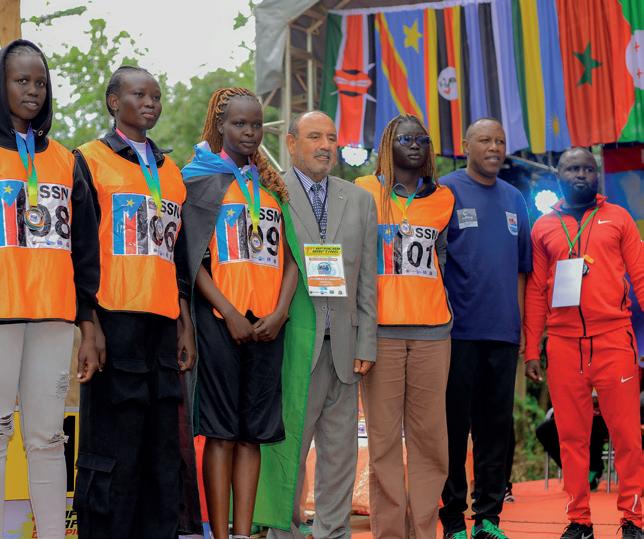
We wanted them to train at a similar intensity to our running athletes

winners
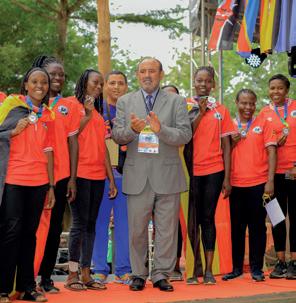
either sports management or sport science courses at local universities so were able to get together to train regularly on the Sagana course in the run-up to the event. Kinuthia says the coaching was inspired by the country’s legacy of dominance in middleand long-distance running.
“They trained for five months ahead of the African Champs,” Kinuthia says. “We wanted them to train at a similar intensity to our running athletes. They understood the Sagana course very well by the end.”
The training also ingrained the trust and collaboration needed between all six rowers on the inflatable dinghy to navigate the fast-flowing water and rocks – it’s no surprise that recreational rafting in Sagana is so popular with Nairobi businesses as a thrilling team-building activity for employees.
Rafting in Argentina will be more of a journey into the unknown. With the Aluminé River
largely formed by melting snow and glacial ice from the mountains surrounding its source, the water temperature is likely to be a good deal lower than the Kenyan teams are used to.
While these chilly conditions are hard to replicate in East Africa, Kinuthia says the teams have been training in unfamiliar waters in preparation for the South America trip. These include Jinja in Uganda and the Indian Ocean off the coast of Mombasa in Kenya’s first sea rafting competition launched this October.
Kinuthia is confident the Kenya national team will “perform well” in Argentina. Whatever the result, the World Championships is sure to prove an important learning experience for the young competitors. The team’s youth – all are aged 24 or younger – is important, Kinuthia says, as the KRF looks to foster the sport’s long-term development in Kenya. “We are looking to the future,” he says. This search for the next generation of rafting stars is beginning even earlier in Sagana with the Federation looking to get keen local high school students – aged 15 to 19 – on the white water.
As these young athletes develop and are helped to reach their full potential, Kinuthia says the sport of white-water rafting will grow around them. The KRF is already looking for new white-water rafting locations in the country for sporting and recreational purposes. Kinuthia says the federation has begun safety checks and mapping of the Yala River in Western Kenya with this in mind.
With youthful energy, world-class training, and a vision for the future, Kenya isn’t just competing; it’s redefining what’s possible on the continent’s rivers. The waves ahead may be unpredictable, but for Kenya, the current is only getting stronger.
To follow the Kenya team’s progress at the Senior World Rafting Championships from November 3 to 9, visit www.kenyaraftingfederation.co.ke
‘A moment of perfection like nothing I had ever known’
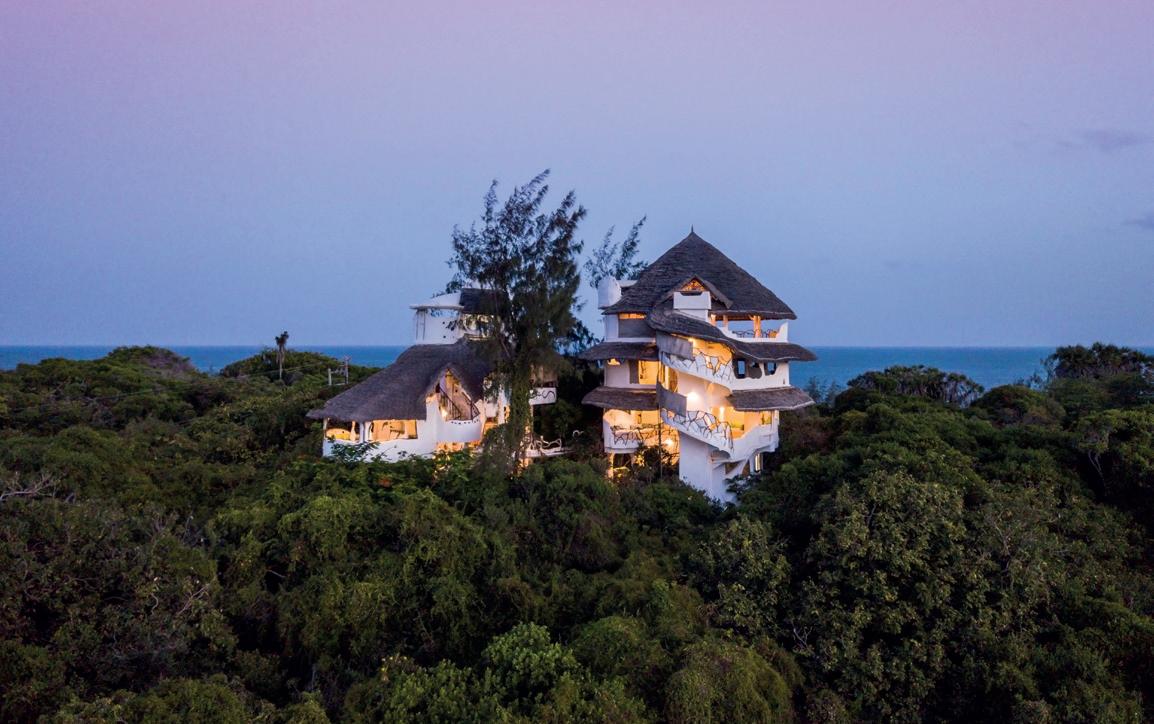
Watamu Treehouse is a boutique Kenyan hotel that allows guests to rest, reset, and restore body and mind. A core part of this world of wellness is the free-to-all morning meditation sessions. Here the hotel’s co-founder, Paul Krystall, talks about his meditation journey and how beginners can adopt the practice to bring more calm and clarity into their lives.

What for you is the purpose of meditation? Meditation at the deepest level helps me get to know my real self, my motivations, and the purpose for which I have come to this planet. This happens gradually by making my mind, which is usually ever-changing and chaotic, still enough to allow me to witness my thoughts and see that they are just thoughts and are not really me. Slowly but inevitably, layer upon layer that is not truly me is uncovered, and I get to know myself better.
Why do you think meditation is important? Most of our education includes a lot of learning how to do things, but almost nothing about how to be. I think we are all put here for a purpose to discover our gifts and to share them with the world. But how do we know where to start? How do we know what questions to ask, how do we know on what to base our actions, if we don’t know who we are? It is important I feel to live life with a deep level of awareness
Watamu Treehouse
and presence and to feel like life has a purpose. Meditation helps me live every day with a little more joy.
How do you advise people make a start to meditate?
Start by choosing something you can do regularly for just 10 minutes a day. It can just be counting your breath, gazing at a flame or listening to a meditation or mindfulness guide on the internet. But just do it – that is the essential part. Make a commitment to do it for 21 days at least – until it becomes a habit.
You can make a nice sitting place in your house. Maybe put a jug of flowers or a candle you can light, that just makes the space pleasing to you. Ideally, choosing a similar time every day is good. And if you have time to stretch your body beforehand, it will aid your ability to sit.
How did you get started meditating? I had been doing yoga for several years and had always enjoyed the breathing exercises and the relaxation at the end of each class. When I started formal meditation sessions my teacher told me the best thing I could do for my over-active mind was to meditate daily. I did this for some time and tone day I experienced total peace and stillness – a moment of perfection like nothing I had ever known.
Do you require any special kind of setting or body position to optimise meditation? The most important thing is to be comfortable. For a formal sitting meditation practice, it is good to have a straight spine and a relaxed body. You can sit cross legged on the floor or the lotus posture if you can do it. Most people are not used to sitting on the floor and would have a better experience sitting upright in a chair with feet on floor and hands on lap.
Note that meditation can (and should) happen throughout your day; any movement or action can become a moment of deep


awareness and presence. You can be in a meditative state while you’re having a conversation, while you’re doing the dishes, while you’re gardening or walking.
What benefits have you noticed from your own meditation?
When I started to watch the thoughts, I could see more clearly how much time I spent on things that were not essential in my life. Big changes happened in my life when I started to realise what was important to me. I began to spend more time doing the things I love. And over time my career in
public health turned into a life of running adventure retreats for children then adults and then starting a retreat centre – Watamu Treehouse. Now we offer daily meditation, yoga and adventures – and I can share with others what has helped me. Today, I use meditation to give my day the best start possible
What is your advice to calm racing thoughts? Thoughts will always arise. Don’t fight them or ban them from your brain, that will only make the thoughts race more. In your meditation practice, be the witness and watch your thoughts with a sense of humour and detachment. Once we stop identifying with the thoughts, they will fade over time.
How long do you advise meditating to begin with?
Meditation should be manageable and enjoyable – especially when you first start out. A few minutes a day done with awareness is better than not doing it at all. Over a few years you can build up to what I try to do now: to sit in deep stillness for at least 20 minutes a time.
At Watamu Treehouse you run free meditation sessions at 6.30am every weekday morning. Can you describe those sessions?

The silent sitting evolved from a practice that was started by a friend who came to stay. It’s a simple, but powerful practice – to just sit in stillness and connect with the heart. We realised that this communal gathering changed the energy at Treehouse as well as in us, and we decided to officially open it up to anyone who would like to join. It has been going for over four years now.
The team behind Watamu Treehouse – your daughter, your partner and yourself – are all trained in Dru yoga and meditation. Can you explain more about this style of wellness?
Dru yoga is a variation of yogic practice that is as much about joy, laughter, awareness, community and nature as it is about end of range, challenging movements or lengthy morning rituals. Similarly, with Dru meditation, there are many techniques but primarily they are focused on opening the heart.

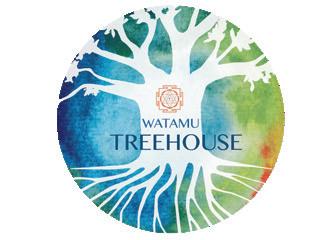
To experience Dru yoga or meditation, visit Watamu Treehouse or Paul also teaches at the Lamu Yoga Festival every year. For courses and teachers in your area, visit www.druyoga.com
For online classes, head to www.drustudio.com where you can do Dru classes online with Aja, Paul’s daughter, or other Dru teachers.



With generous a baggage allowances – 23 kg for checked baggage and 7 kg for carry-ons from JKIA, and 15 kg for checked baggage with 5 kg for hand luggage from Wilson Airport – you can pack everything you need without a worry.
To avoid any last-minute scrambles, plan to leave home early enough to check in at least 1 hour and 40 minutes before your flight. If you’ve got an early morning departure, fight the urge to snooze! Remember, check-in closes 40 minutes before take-off, so giving yourself that extra time is essential. Arriving early means you can kick back and enjoy the journey!
Once you get to the terminal entrance at JKIA or Wilson Airport, watch your luggage glide through security checks – it’s a sign that your adventure is getting closer! After everything’s squared away, make your way
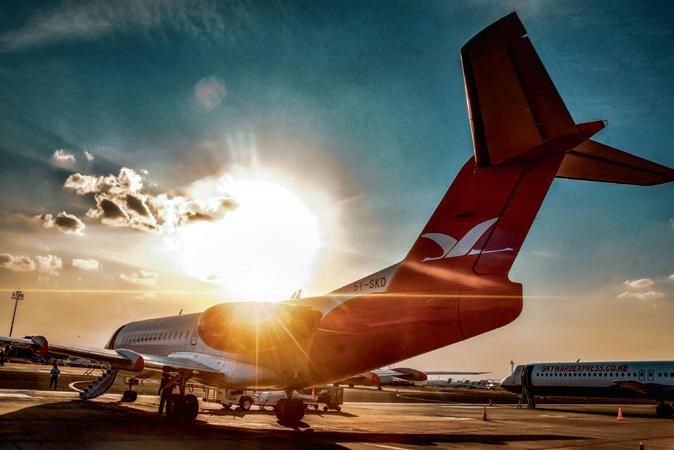
to the check-in counter with your ticket and passport (or national ID) ready to grab your boarding pass. With that done, find a cosy spot in the departure lounge and soak in the travel atmosphere. Your journey is just moments away!
Skyward Airlines is a prominent Kenyan airline‚ established in 2013. Piloted by passionate Kenyans‚ Skyward Airlines prioritises safety and exceptional customer service‚ making us a trusted choice for exploring Kenya. With our main hub at Wilson Airport in Nairobi‚ Skyward Airlines connects major cities and remote destinations across Kenya and into Tanzania‚ playing a vital role in enhancing regional connectivity. Skyward Airlines is recognised for its commitment to reliability‚ affordability‚ and exceptional customer service.
Skyward Airlines offers tailor-made services to suit the needs of our clients. We can provide charter services within the East African region and beyond at competitive prices as well as charter flights for a private holiday‚ corporate travel or a group travel. The cost of a charter flight depends on the size of the aircraft needed to accommodate the number of people. We serve a wide range of businesses and individuals.
While on the plane remember to buckle your seat belt during take-offs and landing. Settle in and get ready for a smooth ride to your destination. Even though most local flights are short, you can still savour those few minutes in the air. Settle into your seat and dive into your copy of Angani, filled with captivating stories and useful tips.
Happy travels!

Help us make your travel experience memorable
Skyward Airlines is proud to connect our passengers to a range of destinations across Kenya and beyond. Whether you’re seeking culture, adventure, or simply a relaxing getaway, our network offers convenient flights to some of the most exciting and beautiful spots. Here’s a closer look at the destinations we serve.
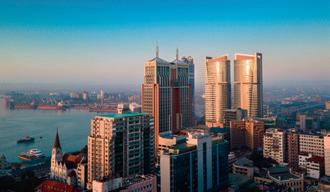
Skyward Airlines launched flights from Nairobi to Dar es Salaam in 2024 connecting Jomo Kenyatta International Airport (JKIA) Terminal 2 with Julius Nyerere International Airport. Dar es Salaam, meaning ‘City of Peace’ in Arabic, is Tanzania’s largest city and its commercial hub. The city is growing rapidly and offers a vibrant arts, music, and food scene. Located on the coast, Dar boasts beautiful beaches like Coco Beach, popular for its lively bars and nightclubs. Explore the bustling Kariakoo Market for fresh produce, second-hand clothes, and local goods, or visit Kivukoni Fish Market at dawn as fishermen bring in the daily catch. For a more relaxed shopping experience, head to The Slipway shopping centre overlooking Msasani Bay.
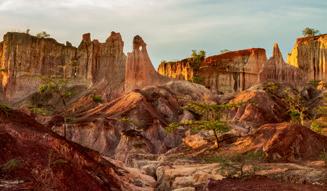
Malindi is a stunning coastal town known for its tropical beaches and rich history. Located 120 km northeast of Mombasa, Malindi is easily accessible from Nairobi,with flights from Wilson Airport taking just over an hour. The area offers visitors breathtaking beaches, a marine national park, and excellent diving and snorkelling opportunities. With warm temperatures year-round, Malindi is a popular destination for sun-seekers.
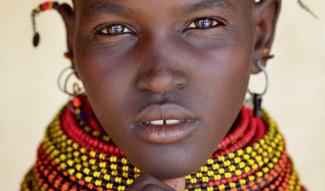
The largest settlement in Turkana County, Lodwar is known as the ‘Cradle of Man’ and this region boasts significant fossil discoveries dating back millions of years. Popular attractions include Lake Turkana, Eliye Springs, and Central Island National Park. Nature lovers will appreciate the beautiful landscapes and heritage that define this remote corner of Kenya.

Nairobi, Kenya's bustling capital is often referred to as the ‘Green City in the Sun.’ Founded in 1899 as a railway camp, Nairobi quickly grew into a political and economic hub. Home to over 4.5 million people, it offers a blend of urban amenities and wildlife experiences. Nairobi is famous for Nairobi National Park, where lions roam just outside the city, as well as the David Sheldrick Elephant Sanctuary, Giraffe Centre, and Karen Blixen Museum. It is also a leading centre for international business with many global companies based here.

In the heart of Uasin Gishu County, Eldoret is known for its association with elite athletes. Visitors can explore the scenic Rimoi National Park, Kerio Valley National Reserve, and Naiberi Campsite. Eldoret is the perfect destination for nature lovers and those interested in sports tourism.
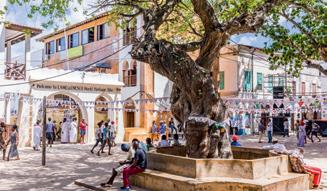
A historic island off the coast of Kenya, Lamu is a Unesco World Heritage Site and a hub for cultural festivals. Visitors can enjoy long sandy beaches, crystal-clear waters, and the slow-paced island life. Explore Lamu Old Town, the Lamu Fort, and the Donkey Sanctuary, or enjoy water sports, snorkelling, and windsurfing. Call centre: +254 709 786 000
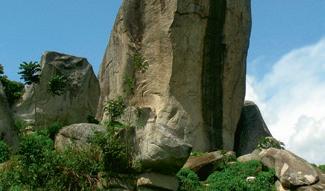
A lively town in western Kenya, Kakamega is known for its lush forests and scenic landscapes. The Kakamega Forest, one of Kenya’s few tropical rainforests, offers opportunities for hiking, birdwatching, and exploring unique wildlife.
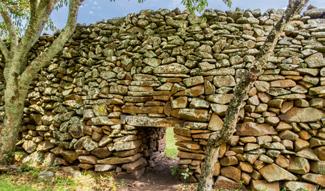
In southwestern Kenya, near Lake Victoria, Migori is a fascinating destination with a deep heritage. Migori’s diverse population and busy local markets reflect the area’s cultural mix. Visitors can explore the nearby Isebania border post, enjoy a boat trip on Lake Victoria, or visit the Sony Sugar Factory.

Mombasa is Kenya’s second-largest city and a key port on the Indian Ocean. Mombasa is famous for its beautiful beaches, including Nyali, Bamburi, and Shanzu, and rich history. From the historic Fort Jesus to the vibrant Old Town, Mombasa is a blend of African, Arab, and European cultures. The city also boasts bustling markets, delicious seafood, and a welcoming atmosphere. Explore the waters on a dhow trip or simply relax on the stunning beaches.

Located in the heart of the Rift Valley, Kitale is a gateway to Kenya’s farming heartland. The town is surrounded by beautiful hills and valleys, offering stunning views and a peaceful atmosphere. Kitale is an excellent base for exploring the surrounding countryside and experiencing the agricultural way of life.

One of Kenya’s top coastal destinations, Diani is famous for its 17-kilometre stretch of white sandy beach and crystal-clear waters – making it a true tropical paradise. The area is home to coral reefs, dolphins, and lush vegetation, including the nearby Shimba Hills National Reserve.
Skyward Airlines is proud to operate a fleet of regularly serviced and well-maintained aircraft. Here is an overview of the aircraft in our fleet, each chosen for its reliability, efficiency, and suitability for flying to various destinations across Kenya and beyond. Whether you're flying to into Nairobi or to more remote airstrips, our aircraft are designed to ensure a smooth, comfortable journey every time.
The Fokker 50 is a versatile twin-turboprop aircraft, capable of carrying up to 50 passengers. Its reliability and spacious cabin make it perfect for regional travel, particularly on shorter or medium-range routes. The Fokker 50 excels at accessing smaller airports, including those with unpaved runwaysideal for Kenya's diverse terrain.
The Dash 8 Q100 is a reliable turboprop aircraft designed for regional connectivity, offering seating for 37 passengers. Known for its efficiency, it operates well on short-haul flights, which is essential for Kenya's numerous smaller airports. With a cruise speed of 310 mph/500 kph, the Q100 delivers a smooth and comfortable experience. Its ability to operate in challenging environments makes it ideal for serving remote or hard-to-reach destinations, ensuring connectivity across Kenya.

A step up from the Q100, the Dash 8 Q200 comes with powerful PW123 engines and
enhanced cargo capacity, while maintaining the same 37-passenger seating. With a cruise speed of 334 mph/537kph, it’s perfect for regional flights across Kenya, providing faster, more efficient travel for passengers and cargo.
The Dash 8 Q300 boasts a 50-passenger capacity and is well-suited for regional flights, offering both comfort and reliability. Its larger seating capacity and advanced features make it a perfect fit for connections to smaller regional hubs. With a cruise speed of 328 mph/527kph and a wingspan of 90 feet/27 metres, it’s designed for efficiency and can operate on a variety of airport surfaces.
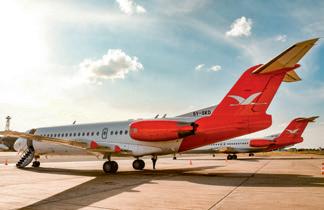
The Fokker 70 is a compact and efficient regional jet with a comfortable cabin, ideal for short-haul flights. Seating around 80 passengers, the Fokker 70 is perfect for domestic travel and offers a reliable option for connecting passengers across the country in comfort and style.
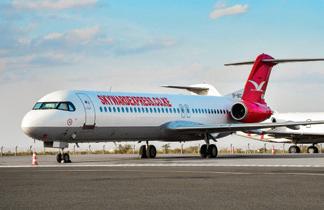
The Fokker 100’s blend of comfort, advanced technology, and operational reliability make it an excellent choice for high-demand flights between cities like Nairobi, Mombasa, and Kisumu.
The Dash 8 Q400 is the largest in the Dash 8 family, with seating for 76 passengers. Known for its quiet operation and speed (414 mph/666kph), it is perfect for city routes and short regional flights. The Q400 is highly efficient and offers exceptional performance even in challenging weather conditions. Its low noise footprint and advanced features make it well-suited for urban destinations with smaller airports, ensuring fast, comfortable, and environmentally friendly travel across the country.

